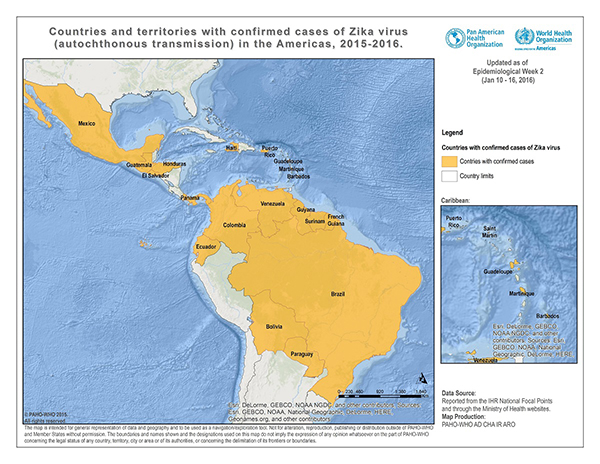Local health officials warn travellers about Zika virus
BELLEVILLE – The local health unit is advising pregnant women who are travelling to the Caribbean to postpone their plans.
Parts of the Caribbean and South America are under advisory over a mosquito-borne virus, called the Zika virus, that may be causing birth defects. Popular spring break destinations such as Mexico and Dominican Republic are on the list.

Map taken from the World Health Organization showing countries affected countries by the Zika virus. Countries in yellow are under advisory and have confirmed cases of the virus. Photo taken from http://www.who.int/en/
Bill Sherlock, program manager for the communicable disease team at Hastings Prince Edward Public Health, said travellers have been calling in and inquiring about the virus.
He recommends pregnant women, who are thinking of going to the affected countries, discuss their travel plans with their health care provider first to evaluate the risk.
His advice is based on advisories from the Public Health Agency of Canada, which oversees public health safety for the country. Each case is individual and each traveller will be given different advice, he said.
“Everyone’s travel plans are different. It really depends on what type of travel you are doing,” he said. “If you are just in and out of the airport, or if you are going to be there for business and you are maybe in a city, working indoors, the advice is going to change depending on the type of travel.”
Other methods of prevention include wearing long sleeve clothing and using mosquito repellent with DEET, which is safe for pregnant women to use.
Hastings Prince Edward Public Health runs a travel and immunization clinic for travellers who have questions about affected areas or require immunizations.
At this time, there is no treatment or preventative immunization against the virus, said Sherlock.
Sherlock stressed that this virus is not considered deadly and symptoms may only appear in about one out of five people affected by the virus, putting pregnant women at the top of the list.
“It’s not everyone that gets the infection who is ill. It depends on your general health. If you are run down, your immune system is compromised, then you may be at risk of more infections.”
Symptoms of the virus include mild fever, pink eye, rash, muscle and joint pain along with general malaise which occurs two to seven days after a bite from a mosquito, according to the World Health Organization.
 Print This Post
Print This Post






